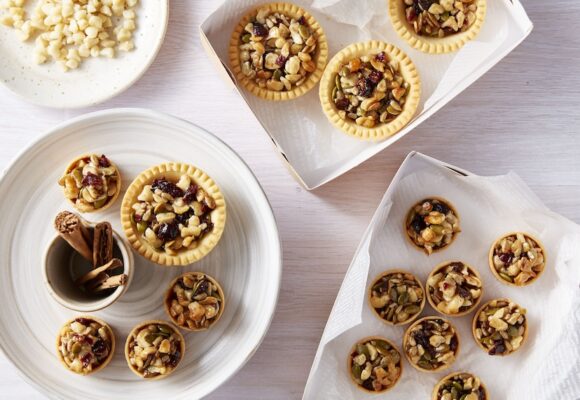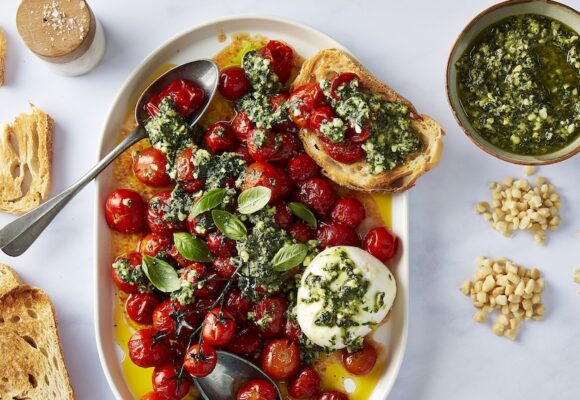
Pam Brook has always been about real food made right. As the co-founder of Australian gourmet food producer Brookfarm, she is uncompromising when it comes to creating the brand’s premium breakfast cereals, snacks and oils that are loved by consumers around the world. When Pam’s son Will (also Brookfarm CEO) started a family, Pam’s attention turned to how she could make a difference to a category they had never tackled before – baby food.
“Having grandchildren made me look at what kids are eating these days and I found it to be overly processed,” explains Pam. “The products are typically one-ingredient foods, but that’s not the way people eat. It’s not the way I was brought up, and it’s not how I brought my kids up.”
So mother and son set to work. After extensive research, learning and testing, they launched Bloom organic baby cereal in November last year, becoming the first baby cereal to introduce tree nuts to children in what Pam describes as a great innovation for the macadamia industry.
Reshaping the allergy conversation through innovation
Bloom combines grains, natural flavours from organic freeze-dried fruits and a small amount of tree nuts, including macadamias, all finely ground.
It was the realisation that nobody was making tree nuts accessible to young children that inspired Pam and Will to launch Bloom. There were no infant food products that contained them, and they’re often banned from childcare facilities due to allergy concerns. Pam hopes Bloom will help parents feel more at ease with including tree nuts in their children’s diets early on.
“One of the reasons this area was so ripe for innovation is that it’s something a lot of people feel scared of, but they don’t need to be,” she says.
“It’s been shown that there’s a stage in the development of the immune system where it’s important to introduce children to potential allergens, between 6 and 12 months of age, and provided there’s no adverse reaction, continue to give it to them over time.”
“Bloom helps parents do exactly that with tree nuts, without being highly processed, and in a way that’s easy to prepare. You simply add warm water or breast milk and it’s ready to serve. It can also be combined with other ingredients like fruit or vegetables.”
The amount of tree nuts in the range is intentionally quite small.
“An average child would consume about 3 grams of tree nuts a week if they ate around 5 serves of Bloom in that time. That serving aligns with paediatric recommendations,” explains Pam.
For people with a known family history of tree nut allergies, the advice of a family doctor or paediatrician is recommended before trying Bloom for the first time.

A fresh approach for conscious parents
In addition to a lack of innovation in the baby cereal market, Pam also noticed the growing popularity of organic and minimally processed food.
Bloom is Brookfarm’s first 100% organic venture, and is created for children aged 6 to 12 months whose parents care about food and where it comes from.
“We’re appealing to people who care about the impact of the foods they feed their children,” she says. “They want to introduce a broad and real diet to their kids. Bloom offers something that wasn’t available to them before.”
“We thought, let’s take real organic delicious food from sustainable farmers, and grind it up finely. It’s about getting back to real food, introducing multi ingredient food and complex flavours and textures early on.”
As a former dentist, Pam, is a big believer in offering children foods with some texture, even when they’re young.
“Most baby cereals have no texture at all, they’re like eating glue,” she says. “Texture is actually a very important part of a food’s flavour. I believe that if we want to bring up resilient kids with good tastebuds we need to introduce them to different ingredients and flavours early.”

What macadamias bring to the highchair
The Bloom range is available in three varieties – Smooth Banana, Smooth Pear and Apple & Carrot, and contains complex grains like amaranth, millet and quinoa.
The finely ground tree nuts in the product include Australian grown macadamias, which Pam says bring a host of benefits to the Bloom range.
“Macadamias bring a lovely rich, smooth taste to the product, and they’re a great way of ensuring babies are getting healthy fats, vitamins and minerals,” she says.
“Babies actually have a preference for slightly fatty flavours, like that of macadamias. They’re also one of the best nuts to grind down to a fine texture and they have a really nice mouth feel.”
Off to a strong start
Pam and Will sought feedback on their products before bringing them to market, but rather than testing their formulations with babies, the team conducted sensory testing with parents.
“We wanted to ensure our products tasted acceptable to the mums and dads. I won’t feed anything I don’t like to my children, and I wouldn’t expect our customers to either!” says Pam.
It seems the testing paid off, with excellent feedback received on the product since it launched.
“Babies have been loving it,” she says. “I think we’ve achieved a flavour balance that is delicious yet gentle and subtle enough not to be overpowering to a young palate. We haven’t had anyone tell us that their child has spat it out!” she laughs.
Bloom is currently stocked in selected supermarkets in Australia and New Zealand, as well as via their online store. Export plans are underway too, with the product expected to start appearing in South East Asian countries later this year.
It’s early days, but we’re looking forward to watching Brookfarm’s new baby go from strength to strength.
For more information, head to the Bloom website. Advice on Australian guidelines for prevention of food allergies can be found at preventallergies.org.au.


